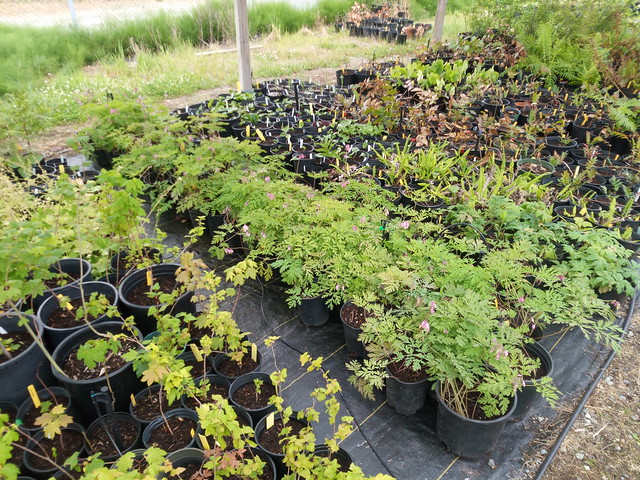
You may not have noticed, but as you walk around the UW campus more of those plants and flowers at your feet are species native to Puget Sound.
That’s because UW’s Society for Ecology Restoration student guild (SER-UW) native plant nursery has been working to restore areas on campus by increasing native species biodiversity and creating open spaces for students to engage with the natural world just steps from their residence halls.
Since 2013, SER has been removing interloper invasive species in Whitman Walk, a north campus site near McCarty Hall and Kincaid Ravine, an urban forest in the northeast corner of campus, to make space for native plants. Now, the student group manages over 2,000 containerized plants, many of which have been placed in these two restoration areas.
The plant nursery is part of the Center for Urban Horticulture, a 16-acre landscaped site housing the UW Botanic Gardens, an outdoor laboratory for UW research, and the 74-acre Union Bay Natural Area, which is home to more than 200 bird species and wildlife.
“We’re in an amazing region of the country that’s doing awesome work for restoration ecology,” said Anna Carragee, one of the plant nursery managers. “As a student group, we’re really trying to address habitat restoration and different ecosystems in general.”
To aid with the process, the student-led organization received over $54,000 from the Campus Sustainability Fund to increase plant production and quality of care for plants. SER is using the money to buy a new hoop house (greenhouse), an irrigation system, a pot-washing station, and several other things needed to sustain plant growth.
The student group hopes to sell its plants to the UW-Restoration Ecology Network (UW-REN), a tri-campus program connecting students of different academic backgrounds in ecological restoration and conservation. If successful, SER’s plants will be part of a larger mission in helping restore ecosystems in areas stretching far beyond UW territory.
“I used to live in New England and restoration ecology is not happening to the same degree there as it is here,” said Carragee. “It’s supported by a lot of people, including the county, city, and state. So, we need to make it a priority to teach students how to properly grow plants and make these restoration projects happen."
SER wants to make it easier to connect everyone who shares a passion for plants and the overall environment. At the start of fall quarter, the student group will continue to host work parties every Friday morning. Anyone interested in ecological restoration can come and learn about proper gardening maintenance, seed collecting techniques, and stem cuttings (the process of growing a new plant from a branch).
“We want to make it a hub of learning and community oriented through hands on experience, kind of like the UW Farm,” said Carragee. “I encourage more students to get involved and know that they can work on something and make it their own, which can be really satisfying when you accomplish what you want.”
